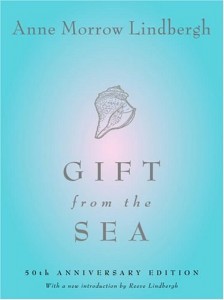by Anne Morrow Lindbergh. First published 1955.
Channelled Whelk
But I want first of all–in fact, as an end to these other desires–to be at peace with myself. I want a singleness of eye, a purity of intention, a central core to my life that will enable me to carry out these obligations and activities as well as I can. I want, in fact–to borrow from the language of the saints–to live “in grace” as much of the time as possible. I am not using this term in a strictly theological sense. By grace I mean an inner harmony, essentially spiritual, which can be translated into outer harmony.
I have learned by some experience, by many examples, and by the writings of countless others before me, also occupied in the search, that certain environments, certain modes of life, certain rules of conduct are more conducive to inner and outer harmony than others. There are, in fact, certain roads that one may follow. Simplification of life is one of them.
Moon Shell
For it is not physical solitude that actually separates one from other men, not physical isolation, but spiritual isolation. It is not the desert island nor the stony wilderness that cuts you from the people you love. It is the wilderness in the mind, the desert wastes in the heart through which one wanders lost and a stranger. When one is a stranger to oneself then one is estranged to others too. If one is out of touch with oneself, then one cannot touch others.
We are aware of our hunger and needs, but still ignorant of what will satisfy them. With our garnered free time, we are more apt to drain our creative springs than to refill them. With our pitchers, we attempt to water a field, not a garden. We throw ourselves indiscriminately into committees and causes. Not knowing how to feed the spirit, we try to muffle its demands in distractions. Instead of stilling the center, the axis of the wheel, we add more centrifugal activities to our lives–which tend to throw us off balance.
Mechanically we have gained in the last generation, but spiritually we have, I think, unwittingly lost.
Nothing feeds the center so much as creative work, even humble kinds like cooking and sewing. Baking bread, weaving cloth, putting up preserves, teaching and singing to children, must have been far more nourishing than being the family chauffeur or shopping at supermarkets, or doing housework with mechanical aids.
But neither is the answer in dissipating our time and energy in more purposeless occupations, more accumulations which supposedly simplify life but actually burden it, more possessions which we have not time to use or appreciate, more diversions to fill up the void.
Argonauta
Perhaps both men and women in America may hunger, in our material, outward, active, masculine culture, for the supposedly feminine qualities of heart, mind and spirit–qualities which are actually neither masculine nor feminine, but simply human qualities that have been neglected. It is growth along these lines that will make us whole, and will enable the individual to become world to himself.
But theory precedes exploration; we must use any signposts that exist to help us through the wilderness. For we are, actually, pioneers trying to find a new path through the maze of tradition, convention and dogma. Our efforts are part of the struggle to mature the concept of relationships between men and women–in fact all relationships. In such a light, every advance in understanding has value. Every step, even a tentative one, counts.
What a wonderful day, I think, turning it around in my hand to its starting point again. What has made it so perfect? Is there not some clue here in the pattern of this day? To begin with, it is a pattern of freedom. Its setting has not been cramped in space or time. An island, curiously enough, gives a limitless feeling of both. Nor has the day been limited in kinds of activity. It has a natural balance of physical, intellectual and social life. It has an easy unforced rhythm. Work is not deformed by pressure. Relationship is not strangled by claims. Intimacy is tempered by lightness of touch. We have moved through our day like dancers, not needing to touch more than lightly because we were instinctively moving to the same rhythm.
When you love someone you do not love them all the time, in exactly the same way, from moment to moment. It is an impossibility. It is even a lie to pretend to. And yet this is exactly what most of us demand. We have so little faith in the ebb and flow of life, of love, of relationships.
A Few Shells
One cannot collect all the beautiful shells on the beach. One can collect only a few, and they are more beautiful if they are few. One moon shell is more impressive than three.
Actually these are among the most important times in one’s life–when one is alone. Certain springs are tapped only when we are alone. The artist knows he must be alone to create; the writer, to work out his thoughts; the musician, to compose; the saint, to pray.

